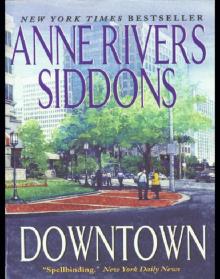- Home
- Anne Rivers Siddons
Homeplace Page 32
Homeplace Read online
Page 32
And yet, nothing did. Priss came and went, Sam came and was gone again, DeeDee trundled in and out, paler and damper and more distracted than Mike had ever seen her. She did not mention the terrible morning at the club; seemed, in fact, to have forgotten it in her concern for her father. For she was obsessed in those long, heavy days with John Winship. She came nearly every day, leaving a presumably chastened and biddable Duck to stay with his mother, and fussed and whimpered and fidgeted until Priss and Mike and sometimes John himself shooed her home again. She had reacted with tears and wails when Mike had told her about the Department of Transportation’s ponderous victory over their father and had insisted on coming directly over to flutter at his side until he had exploded at her, and she had gone home in fresh tears. After that, she was on to Mike about him several times a day, either by telephone or in person, dropping in in the mornings before he was up or in the evenings after he had been put to bed.
“But how is he really?” she would say, and her voice would tremble on the edge of hysterics. “I know he’s putting up a brave front, but how is he really, when he’s by himself with just you? Didn’t it just about kill him? What does he say? Did he ever cry, or anything? Oh, God, poor Daddy, poor Daddy …”
“It’s not a front,” Mike would try to reassure her. “He’s really fine. He took it wonderfully, we’re surprised at how well. Of course he didn’t cry. When did Daddy ever cry? He’s accepted it better than the rest of us. He doesn’t say anything at all about it; he seems to have almost forgotten it. Really, Dee, what on earth is wrong with you? You wanted this over. You’d think you’d done the black deed yourself, the way you’re carrying on. You’re upsetting him far more than the DOT with all this crying and hovering.”
And DeeDee would take herself off, tear-stained and distraught, but she would call again, or come by again, and again she would say, fearfully, the tears standing in her blue eyes, “How is he, really?”
Mike had never seen her sister so agitated and finally she asked Bay Sewell if he could reassure her, as he seemed to have done after the debacle at the country club with Duck. He must have done so, because after that DeeDee did not come so often to the Pomeroy Street house, and she did not call, and the airless stasis of the suspended time between the end of the fight and the death of the homeplace dropped down again. August was totally stopped and still, an underwater place.
In the last week of the month, Sam Canaday learned that the Department of Transportation would move onto the homeplace the Tuesday after Labor Day with a bulldozer and crew. He told Mike and Priss and J.W. that evening, on the shadowy porch, before he came in to see John Winship, and he cautioned them to keep the news from him.
“Treat it as a normal day,” he said. “Don’t do anything different. Try not to think about it. Don’t go down there yourselves. You don’t want to see that. I’m not going. We’ll tell him when it’s over and cleaned up.”
They agreed.
“But I really think he’s made his peace with it,” Mike said.
“Oh, sure,” Sam said. “Like a death he can’t prevent. But that doesn’t mean he has to watch the execution.”
Mike’s heart lay heavy and stonelike within her for the rest of the days in that week. The heaviness damped, for a time, the prowling, prickling unease.
“It’s like waiting for another death, a second one,” she told Bayard Sewell on the phone that evening, after her father was in bed and everyone had gone. “In a way it’s worse, because I know the date of this death. Bay, you mustn’t let on to him. You know what Dr. Gaddis said about his heart, and a shock …”
“Jesus, Mike, what do you think I am?” he said. “God, poor John. It’ll be better when it’s all over. It really will. We can all … get on with things, see where we are, sort of. Make some plans. Mike … if I don’t see you soon I think I’ll go out of my mind.”
“Me, too,” she said miserably. “Oh, me too.”
Three days later her father waked her in the night screaming hoarsely and terribly with the pain, and he screamed over and over again, monotonously and rhythmically, thrashing from side to side in the sweat-soaked bed, the cords of his gaunt old neck standing out, the bursting veins crawling like worms under the dead-white skin of his forehead, his eyes vacant and focused far away; screamed and screamed and clawed with his corpse’s fingers at the agony-reddened air until the running feet and plunging needle of Dr. Gaddis hurled him fathoms deep into unconsciousness. Mike, dripping wet and shaking so that she could scarcely stand, cleaned his wasted, motionless old body of the excrement that it had ground itself in, and J.W. helped her put clean pajamas onto him and strip the fouled sheets. There was blood and mucus on the bedclothes as well as feces, and a ghastly, fetid, green-black stain that was like nothing she had ever seen before. Sam Canaday arrived after the doctor had come out of her father’s room, and they all sat drinking the coffee that J.W. had made, not speaking. It was nearly four in the morning, but no one, not even the bonelessly slumped doctor, made a move to leave. No one broke the silence. There was, Mike knew, nothing now to say. They had come to an ending. Whatever it was she had felt coming was here.
“What now?” Sam Canaday said, finally. His voice was rusty and hoarse, as if it had not been used for a long time. “The hospital?”
“If you want to, Mike,” Dr. Gaddis said, looking at her. “I can admit him in the morning. Maybe save you a good bit of work and grief. But they’ll just give him more of what I’ve been giving him, and I can up the dosage as high as he can stand without killing him as well as they can. He might as well stay here, if you can take it. He’ll need lots of nursing.”
“I can take it,” Mike said. “I don’t want him to go to the hospital. I can look after him, Lavinia and I. But he can’t stand anything like tonight again, and I can’t either.”
“He won’t have that again,” the doctor said. “That’s one thing I can make sure of. I guess I should have upped that dosage before now. He was doing so well, though, and it seemed like he was enjoying those visits with Priss, so I wanted to let him stay lucid as long as he could. I can stop most of the pain, but he isn’t going to know much from here on out.”
“Do it,” Mike said. “I’m not going to have him hurt like that. I don’t want him aware that he’s … not in control. Priss and I will be here when he does wake up, and Sam, too …” She looked at him, and he nodded. His face was as still and white as that recent afternoon in the back hall, looking up at her …
“We’ll all be here,” he said. He turned to the doctor. “Is it … now? Is this going to take him out, like in the next few days?” Mike knew he was thinking of the bulldozers crawling insectlike onto the swept white yard around the homeplace, of the terrible mandrake scream of splintering wood. Better, maybe, if it were now …
“I don’t have any idea,” the doctor said. “Probably not. His heart’s still hanging in there. It’s amazing.”
“Way to go, Colonel,” Sam Canaday said softly.
John Winship did not wake up until the following afternoon. Mike and Sam had been sitting in silence for almost two hours, in kitchen chairs drawn up beside the old bed in the dark, monkish bedroom. The air conditioner pumped steadily, almost in rhythm with the pulse that beat shallowly in the parchment-yellow throat. Mike had slid almost into sleep, and she jerked awake when she heard her father’s voice, sharp and birdlike and clear in the thrumming room, say, “Are you still working on your book, Micah? I don’t want you to let that slide, whatever you do.”
She looked up. He was staring at her, his eyes brilliant with something … fever, or some sort of importuning. It was a look she could not read.
“Yeah,” Sam Canaday said, and the old jeering, sardonic note was back in his voice, under something that sounded like an anger born of grief. “You still holed up these hot afternoons with that book, Mike?”
Mike looked at him and felt the traitorous heat flood into her chest and neck and up into her face.
“Yes,”
she said. “I’m working on the book.”
That night, aching with fatigue and stiff with a kind of promissory dread, she reached into the bottom of the suitcase she had stowed at the back of her closet on the morning after she had come home, and took out a fresh yellow legal pad. She pulled a felt-tip pen out of her desk drawer and uncapped it. She stared at the slick, lined yellow surface of the paper for a long moment, and then she wrote at the top of the first sheet, Going Back. After a moment, she added, by Micah Winship. Then, in a little rush, she wrote on the paper, “Two months ago, in the summer of my fortieth year, I came back for the first time in a quarter of a century to my father’s house.”
She stared at the words, flung in a strong, slanted backhand across the paper, for a little space of time, and then she dropped her face into her hands.
“Oh, God,” Mike whispered to herself. “Oh, God.”
And then she raised her head and began to write again, and she wrote and wrote, for a long time, far into the night.
29
“DON’T GO YET,” BAYARD SEWELL SAID, REACHING OUT AND taking Mike’s arm just above the elbow. His hand was cold, almost shockingly so, in the hot, dim room. His fingers were surprisingly hard on her flesh, biting deep. Mike lay back against the piled pillows and looked at him. She had thought he was asleep.
“I ought to look in on Daddy,” she said. “We’ve been up here for nearly three hours. It’s been four since he got his last pills.”
“I looked in on him when I came in,” he said. “He was cutting Z’s like there was no tomorrow. Relax, Mike. You’re strung as tight as a bow. He’s not going to wake up. You gave him a double dose, didn’t you?”
She nodded, feeling somehow guilty, though the doctor had told her that two pills, or even three, would not be amiss if her father needed them. They would, he had said, only make him sleep more deeply and longer. Bay Sewell had asked her to do it when he had told her that he wanted to come to her that afternoon, and she had agreed with no hesitation. It had been almost a month since they had made love, or even been alone together. And on this of all days, she needed him with a pain that was deeply and pungently physical.
“I just cannot wait any longer,” he had said earlier in the Labor Day weekend just past. “And I want to be with you on the day that they … take the house. I want to be in the house with John, just in case. Can’t you persuade Priss and Canaday to back off just that one day? And can’t you give your dad a little something extra to make sure he sleeps through? It would be better if he just slept the day away, Mike. That way there’d be no chance at all he’d find out. We can tell him when it’s over.”
“Sam was going to do that anyway,” Mike said.
Bay scowled, but said only, “Well, then. Can you fix it?”
“Oh, yes,” she had breathed in relief and anticipation. “I’ll do it right away. Bay, I’m so glad. I didn’t know how I was going to get through that day.”
“Do you all mind if it’s just Daddy and me next Tuesday?” Mike asked Sam and Priss on the Sunday before the bulldozers were scheduled to destroy the homeplace. “I’m going to give him an extra pill and let him sleep through it all, and I’d just as soon be by myself. We can meet for supper and decide then if he’s up to hearing about it.”
“If that’s what you want to do,” Priss said, frowning a little. “I don’t like the idea of doping Scamp to the eyebrows, though. It’s as if we were giving belladonna to a fussy baby.”
It was so like that that Mike flushed and averted her eyes. “I just don’t think I can sit in that room by his bed in some ghastly deathwatch for the homeplace,” she said, and it was true. “I used to think he could read my thoughts, and I’m still not sure he can’t.”
“You are a pretty bad liar,” Priss said. “All right, if you’ll promise you won’t sit around moping, and you’ll call me if you get broody.”
“Sam?” Mike said. “Is it okay with you not to be here?” She thought of the tumbled bed that waited for her upstairs and could not meet his eyes, but she had to make sure he would not come to the house.
He nodded, but said nothing. He did not look at her either. Mike thought that he looked almost ill; gray-faced under the tan, and much older. Soon after that he went in and said good night to John Winship, and left, and Priss followed him. She did not go in to see John.
“I’ll be here whenever he’s awake, if he wants me,” she had told Mike after the terrible attack of pain, when the doctor increased the sedatives and painkillers so drastically. “But I’m not going in there and stare at him while he’s knocked out. Scamp sets great store by his dignity. He’d never forgive me.”
“He had to have the medicine,” Mike said pleadingly. The implied criticism stung, and she herself hated keeping her father in the eerie twilight sleep in which he had lived for the past few days. “You didn’t hear him screaming; you didn’t see him. He can’t go through that again.”
“I know he can’t,” Priss said, and tears stood again in her clear green eyes. “And I can’t look at him drugged up. I’ll see him when he surfaces.”
And he did surface, once or twice a day, usually in the early morning and again toward evening. When he did, he was peaceful and lucid and actually smiled at them, a very different smile from the fierce rictus that Mike had seen since she had returned home. It was almost a gentle smile, if skewed, and a totally knowing and full-dimensioned one. There was no question but that he was fully with them at those times, and free, now at the last, from the rage and tension that had ridden him, furylike, for so long. He was, in those moments, a man Mike did not know; had never known, and she was not sure how to deal with him.
He had been awake when she took in his two o’clock medicine earlier, and had been lying peacefully, listening to his television set but not looking at it, regarding the ceiling of the curtained room with interest. Mike had sent Lavinia Lester home early and brought a glass of chocolate milk with the pills. It was one of the few things John Winship could still tolerate. He was growing thinner and more transparent daily; it seemed impossible that life could pulse so stubbornly in his wasted body. But his voice was strong and his color distinctly visible, if faint. “Two pills?” he said.
“Can you manage two?” Mike said, turning down the volume on the television set. “Lavinia’s gone for the day, and Sam and Priss aren’t coming until after supper. I thought you might like a chance to get some extra sleep.”
“Fine, if you’ll get some, too,” he said. “You look tired. I’m afraid it’s been hard on you, baby-sitting me.”
“Not a bit of it,” Mike said. For some reason a great knot of aching, unshed tears had gathered in her chest, just at the base of her throat, and it was difficult to speak. He seemed, there in the monastic white bed, hardly even to make a rise in the covers. He was very still. She could actually see the light through his old, curled hands. She remembered that when she was a small child, his forearms had seemed to her as strong and knotted as the limbs of a tree. She adjusted the curtains, closed the Venetian blinds, and stopped to raise his head so that he could swallow the pills.
“Just leave ‘em,” he said. “I’ll take ’em directly. I sort of want to hear the end of Perry Mason. If Sam Canaday was that good a lawyer he’d be rich.”
Mike smiled around the salty knot and walked to the door of the room.
“You take them after the program is over, though,” she said.
“I will,” he said. And then, “Micah?”
“Yes?”
“You’ve turned out to be a real pretty girl. Real pretty girl. Ought to have told you before,” he said.
“Thank you, Daddy,” Mike said, and fled up the stairs to her bedroom before the tears could spill over her bottom lashes. But once there she did not cry; could not.
Bayard Sewell had come an hour later, at three, rapping softly at her door and coming quietly into the room on the soft soles of his Topsiders when she called out, “Come in.” She wore a simple white column of char
meuse night dress that he especially liked, and had brushed her hair to drifting gilt, and sprayed on a gust of the Giorgio that he had brought her from Boston. She did not like the musky, insinuating perfume, but he claimed that it was a powerful aphrodisiac, and it had become a sort of joking symbol between them. Whenever Mike wore it, she meant to be taken hard and with roughness.
He had smiled today when he smelled it and had laid her back with haste and hard hands and had gone quickly into her, without the teasing, indolent ritual of foreplay that they sometimes prolonged almost past endurance, and she had arched her back and set her hips in preparation for him, but almost immediately she had known it was going to be no good. She was tight and dry, and after the first great swollen thrust or two he went suddenly flaccid and spilled out of her. They tried again, intent and sweating, but he could not stay erect. Finally, flushed and disheveled from laboring under him, she rolled aside and hugged him to her and buried her face in his damp neck.
“Truce, darling,” she said. “It’s just not the day for it.”
His face was dark with blood; he looked almost angry.
“That’s never happened to me before,” he said tightly.

 Colony
Colony Nora, Nora
Nora, Nora House Next Door
House Next Door Homeplace
Homeplace Downtown
Downtown Peachtree Road
Peachtree Road Sweetwater Creek
Sweetwater Creek Fault Lines
Fault Lines Low Country
Low Country The Girls of August
The Girls of August Burnt Mountain
Burnt Mountain Islands
Islands